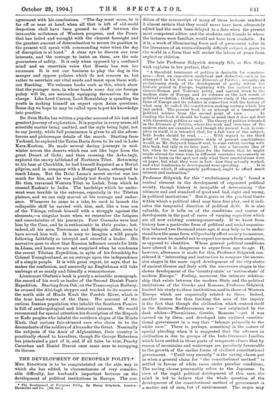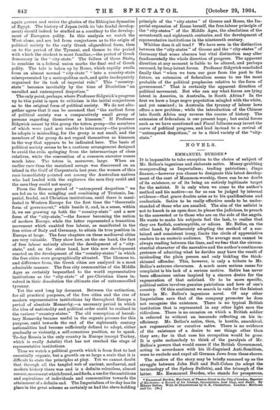• The Development of European Polity. By Henry Sidgwick. London
: Macmillan and. Co. [10s. net.]
dition of the manuscript of many of those lectures rendered it almost certain that they would never have been adequately edited had the work been delayed to a date when the present most competent editor, and the students and friends to whom the lectures were familiar, would not have been available. As it is, a work of illuminating force and of permanent value in the literature of an extraordinarily difficult subject is given to the world in a form that will secure the labour of years from neglect or oblivion.
The late Professor Sidgwick strongly felt, as Mrs. Sidg- wick explains in her preface, that-
" A threefold treatment of politics is desirable for complete- ness ;—first, an exposition analytical and deductive, such as he attempted in his work on the Elements of Politics ; secondly, an evolutionary study of the development of polity within the historic period in Europe, beginning with the earliest known Graeco-Roman and Teutonic polity, and carried down to the modern state of Europe and its colonies as the last result of political evolution ; thirdly, a comparative study of the constitu- tions of Europe and its colonies in connection with the history of what may be called the constitution-making century which has just ended. The present book is an attempt at a treatment of political science from the second point of view Ir reading the book it should be borne in mind that it does not deal with theoretical politics as such. The theory of politics is treated in the Elements of Politics, where the work and structure of the modern state are examined, and though the present book is com- plete in itself, it is intended that, for a full view of the subject,
both books should be read With regard to the third point of view, the comparative study of present constitutions would, as Mr. Sidgwick himself said, to some extent overlap with this book, but only in its later part. It was a favourite idea of his, when he was making plans for the future, that ho might reside abroad for some time in different countries successively in order to learn on the spot, not only what their constitutions were on paper, but what they were in fact—how they actually worked, and what tendencies to development were operating
It is a scheme which, if adequately performed, ought to afford much interest and instruction."
Professor Sidgwick for this " evolutionary study " found a central element in the development of organised political society, though history is incapable of determining " the ultimate end and standard of good and bad, right and wrong, in political institutions." But it gives us the practical limits within which a political ideal may have free play, and it indi- cates the tangential direction of political drift. It is also valuable, for it tells us of the conditions and course of development in the past of races of varying capacities which are all now existing contemporaneously. If we know from history how a particular form of political and social organisa- tion behaved two thousand years ago, it may help us to ender- stand how the same form will probably affect society to-morrow. But we must be careful not to expect too much from analogues, as opposed to identities. Where general political conditions have altered it is dangerous to argue from age to age. If, however, allowance is made for this, Professor Sidgwick con- sidered it " interesting and instructive to compare the succes- sive stages in the more rapid development of the city-states of ancient Greece and Italy with the successive. stages in the slower development of the `country-state' or 'nation-state' of modern Europe." Feeling, moreover, the intimate relation- ship that exists between the modern State and the political institutions of the Greeks and Romans, Professor Sidgwick limited his study to these institutions, and to those of Western Europe which are organically related to them. Indeed, another reason for thus limiting the area of the inquiry is the fact that though the civilisation which centred itself in the Eastern Mediterranean was " not originated by the dark whites—Phoenicians, Greeks, Romans "—yet it was carried on by them, and developed into civilised constitu- tional government in a way that " belongs primarily to the white race." There is, perhaps, something in the nature of special pleading when it is suggested that the advance in civilisation is due to groups of the Indo-Germanic families which have settled in those parts of temperate climes that by reason of mountains and waterways are peculiarly favourable to the growth of the earlier forms of civilised constitutional government. "Until very recently" is the saving clause put in when a general claim for " the constitutional method " is settled in favour of white races under peculiar conditions. The saving clause presumably refers to the Japanese. In view of the rapid political development of this race, the mind is led to believe that the whole question of the development of the constitutional method of government is a matter not of race, but of environment. The negro may again govern and revive the glories of the Ethiopian dynasties of Egypt. The history of Japan (with its late feudal develop- ment) should indeed be studied as a corollary to the develop- ment of European polity. In this analysis we watch the West alone, and are led from conjectures as to the origin of political society to the early Greek oligarchical form, then on to the period of the Tyranni, and thence to the period with which the student is most familiar,—the period of Greek democracy in the city-state." The failure of those States to combine in a federal union marks the final end of Greek polity. The tale is taken up by Rome, which rapidly swells from an almost normal " city-state " " into a country-state misrepresented by a metropolitan mob, and quite inadequately organised for its task of imperial rule." This " country- state " becomes inevitably by the time of Diocletian " an unveiled and untempered despotism."
The only point, perhaps, where Professor Sidgwick's progress up to this point is open to criticism is the initial conjectures as to the original form of political society. We do not alto- gether agree that it can be assumed that "the earliest form of political society was a comparatively small group of persons regarding themselves as kinsmen." If Professor Sidgwick meant by this group the totem group—the members of which were (and are) unable to intermarry—the position he adopts is misleading, for the group is not small, and the members of the group do not regard themselves as kinsmen in the way that appears to be indicated here. The basis of political society seems to be a cautious arrangement designed to avoid the evils springing from the intermarriage of close relatives, while the convention of a common ancestor comes much later. The totem is, moreover, large. When an earlier race than the mainland savage was discovered on an island in the Gulf of Carpentaria last year, the women of this race immediately pointed out among the Australian natives who had landed with the explorers the men they could and the men they could not marry.
From the Roman period of "untempered despotism" we are led on to the mingling and combining of Teutonic, Im- perial, feudal, and Christian institutions, until there is mani- fested in Western Europe for the first time the "theocratic form of government," while beside it, and, in a sense, within it, we see growing up both the " country-state " and a new form of the "city-state,"—the former becoming the nation of modern Europe, while the latter represented a transition movement which enabled free labour, as manifested in the free cities of Italy and Germany, to attain its true position in Europe at large. The four chapters on these mediaeval cities are very valuable. They show how, on the one hand, the fact of free labour entirely altered the development of a "city- state," and, on the other hand, how this new development reacted on the development of the "country-states" in which the free cities were geographically situated. The likeness to, and difference from, the Greek cities are analysed in a most admirable manner. The free city communities of the Middle Ages as certainly bequeathed to the world representative institutions as the " city-state " of pre-Christian times in- volved in their dissolution the ultimate rise of untrammelled tyranny.
Yet the seed long lay dormant. Between the extinction, for all practical purposes, of the free cities and the rise of modern representative institutions lay throughout Europe a period of absolute Monarchy,—a necessary period in which the idea of nationality and political order could be realised in the various "country-states." The old conception of heredi- tary Monarchy became useful in the organic process for this purpose, until towards the end of the eighteenth century nationalities had become sufficiently defined to adopt, either gradually or violently, a self-conscious position, so to speak. To-day Russia is the only country in. Europe (except Turkey, which is really Asiatic) that has not reached the stage of representative institutions.
Thus we watch a political growth which is from first to last essentially organic, but a growth on so large a scale that it is difficult to state the principles at play. Yet we cannot doubt that through all the tangled web of ancient, mediaeval, and modern history there was and is a definite relentless, almost cosmic, movement which found, and finds, a use for the ambitions and aspirations of individuals and communities towards the attainment of a definite end. The Imperialism of to-day has its place in the great scheme as certainly as had the slave-holding
principle of the " city-states " of Greece and Rome, the Im- perial expansion of Rome herself, the free-labour principle of the " city-states " of the Middle Ages, the absolutism of the seventeenth and eighteenth centuries, and the development of representative institutions in the nineteenth century.
Whither does it all tend P We have seen in the distinction between the " city-states " of Greece and the " city-states " of Germany that some obscure but vital distinction may alter fundamentally the whole direction of progress. The apparent direction at any moment is liable to be altered, and perhaps reversed, by long-latent forces. Professor Sidgwick concluded finally that " when we turn our gaze from the past to the future, an extension of federalism seems to me the most probable of the political prophecies relative to the form of government." That is certainly the apparent direction of political movement. But who can say what forces are lying latent in America, in Australia, in South Africa P In the first we have a huge negro population mingled with the white, and yet unmixed ; in Australia the tyranny of labour laws offers a new problem ; while the introduction of the Chinese into South Africa may reverse the course of history. The extension of federalism is oar present hope ; but social forces such as we have mentioned and Fiscal fallacies may invert the curve of political progress, and lead instead to a revival of "untempered despotism," or to a third variety of the "city- state."



















































 Previous page
Previous page